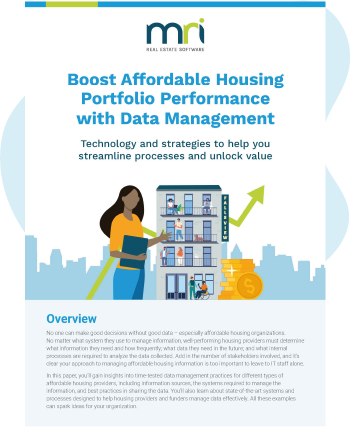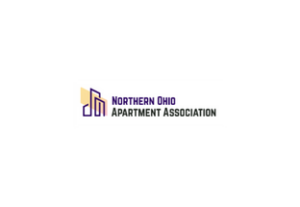Data management: The foundation of affordable housing performance
When you don’t have good data, it’s hard to make good decisions – especially when you manage an affordable housing portfolio. Fortunately, high-performing housing providers have established best practices for collecting, analyzing, and managing data that you can use to boost your portfolio’s performance. This overview shares ideas you can use to optimize your organization’s performance.
Before diving in, it’s important to remember that data management responsibilities shouldn’t be left to solely to your IT staff. You need to examine multiple data sources and needs across a variety of teams. Effective affordable housing data management requires collaborating with many stakeholders across your organization to get the best results.
Data Management
Data collection and analysis
A good data management policy not only enhances operational efficiency, but also ensures compliance, improves financial performance, and ultimately leads to better decision making.
The first step in planning your data management approach is understanding who your users are and where your organization fits in the capital stack, which defines your short- and long-term financial and legal responsibilities. Different stakeholders have different relationships and levels of risk with each asset, so the intensity and focus of their data collection and analysis will vary accordingly.
Next comes establishing your data management policy, which should address several important considerations. You need to clearly define the types of data you need, as well as the stakeholders who will provide that data (including property managers, general partners, and sponsors) and how often you should collect the data to keep it current. You must also establish processes for validating the data, storing it securely, and determining who can access and update it.
Asset management systems
As you manage more affordable housing assets, you’ll need a central database to remain organized and efficient. With a centralized data management system, you can ensure all relevant information is accessible, accurate, and up to date, enabling your team’s asset managers to make more informed decisions.
However, traditional processing systems like property management accounting software aren’t great for comprehensive asset management. They often can’t integrate and analyze the many datasets required to manage assets effectively. It’s better to implement holistic asset management software that can provide data integration, real-time analytics, and robust reporting features.
Document Management
Data collection and asset management are crucial for managing affordable housing data, but you shouldn’t overlook document management. Stakeholder rights and responsibilities are outlined in multiple project documents, making them critical tools that provide essential information and guidance. While asset managers typically access these documents only a few times per year need to review a few key provisions, that’s not always the case. More frequent and comprehensive consultation is needed when significant problems or changes arise.
These steps can help you develop an effective approach to document management:
- Identify the system and specific area for document storage.
- Establish a logical and consistent structure for organizing documents, including a standard file labelling convention.
- Implement policies and procedures for document retention, backup and recovery, and security.
- Ensure your document management system integrates with your other data management systems so everyone on your team can share data and collaborate.
You can integrate document management into your existing data/asset management system or make it a standalone system. Either way, a robust document management protocol is an essential factor in affordable housing portfolio growth.
Streamline data management and unlock value with technology
This is only a high-level view of how effective data management helps you support operational efficiency and strategic decision making, as well as ensure compliance with external requirements. Our recent whitepaper, Boost Affordable Housing Portfolio Performance with Data Management, takes you on a deeper dive into these time-tested best practices, and demonstrates how a data management system gives you a powerful tool for assessing and mitigating risk, as well as producing detailed and insightful internal and external reports. You’ll also learn how advanced software solutions like MRI Investment Central help you can streamline your reporting processes, enhance data accuracy, and gain valuable insights that drive portfolio growth and success.
Boost Affordable Housing Portfolio Performance with Data Management
No one makes good decisions without good data – especially affordable housing organizations.

MRI Solution Showcase: How to Stay Lean, Compliant and Resilient
Your missions matters, especially in uncertain times. Make sure you have what you need to manage compliance, vouchers, waitlists, and more with core solutions.
